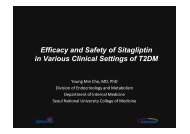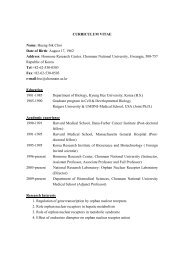3 rd Announcement - 2011 International Conference on Diabetes ...
3 rd Announcement - 2011 International Conference on Diabetes ...
3 rd Announcement - 2011 International Conference on Diabetes ...
- No tags were found...
Create successful ePaper yourself
Turn your PDF publications into a flip-book with our unique Google optimized e-Paper software.
Sessi<strong>on</strong> overview<br />
Plenary lecture I<br />
Friday 11 NOV. (10:30~11:10)<br />
The diabetic foot in <str<strong>on</strong>g>2011</str<strong>on</strong>g><br />
Andrew J. M. Boult<strong>on</strong><br />
(University of Manchester, UK)<br />
Prof. Andrew James Michael Boult<strong>on</strong> is currently a professor at University of<br />
Manchester and University of Miami. His academic interest has been in the areas of<br />
complicati<strong>on</strong>s of diabetes, particularly the diabetic foot disease and diabetic<br />
nephropathy. He has written over 400 articles and participated as a co-author of 8<br />
relevant books. Professor Boult<strong>on</strong> was the editor of the "Diabetic Medicine" from 1991<br />
to 1995. After serving as a president of the "Diabetic Foot Study Group" of EASD and the<br />
"Foot Wound Interest Group" of ADA, he is now a vice-president of EASD. At this<br />
symposium, Professor Boult<strong>on</strong> will give a presentati<strong>on</strong> <strong>on</strong> recent research trends,<br />
changes in treatment and prospects <strong>on</strong> diabetic foot disease with a title of “An update<br />
<strong>on</strong> the diabetic foot for <str<strong>on</strong>g>2011</str<strong>on</strong>g>.”<br />
Plenary lecture II<br />
Satu<str<strong>on</strong>g>rd</str<strong>on</strong>g>ay 12 NOV. (14:00~15:00)<br />
Systemic impact of adipocyte-derived factors: impact <strong>on</strong><br />
hepatic physiology<br />
Philipp E. Scherer<br />
(UT Southwestern Medical Center, USA)<br />
Prof. Philipp Scherer is a director of Touchst<strong>on</strong>e <strong>Diabetes</strong> Center, UT Southwestern<br />
Medical center. As a worldwide leading scientist, Dr. Scherer has been working <strong>on</strong> the<br />
integrated physiology of the adipocyte and the impact <strong>on</strong> whole body energy<br />
homeostasis, inflammati<strong>on</strong> and cancer. He is <strong>on</strong>e of pi<strong>on</strong>eers to identify adipocytederived<br />
factors (adipokines) and adipocyte physiology. Especially, he has cl<strong>on</strong>ed<br />
“adip<strong>on</strong>ectin” and has elucidated the downstream signaling of adip<strong>on</strong>ectin in the<br />
regulati<strong>on</strong> of carbohydrate and lipid metabolism. Recently, his research team has<br />
dem<strong>on</strong>strated that adip<strong>on</strong>ectin also plays a role in cancer cell growth and survival. In<br />
this presentati<strong>on</strong>, he will discuss the impact of adipokines <strong>on</strong> liver physiology.<br />
Special lecture<br />
Friday 11 Nov. (11:10~11:40)<br />
New agents in development for therapy of type 2 diabetes<br />
Robert R. Henry<br />
(University of Califormina, San Diego, USA)<br />
Robert R. Henry is now a professor of Medicine and Divisi<strong>on</strong> of Endocrinology &<br />
Metabolism at University of California, San Diego.<br />
And he is also currently a President of American <strong>Diabetes</strong> Associati<strong>on</strong> and Science and<br />
is a member of the European Associati<strong>on</strong> for the Study of <strong>Diabetes</strong>, the Obesity Society,<br />
the Endocrine Society, the Royal College of Physicians and Surge<strong>on</strong>s of Canada and<br />
Edinburgh, and the American Federati<strong>on</strong> for Clinical Research.<br />
He has written about 200 original articles and participated as a co-author of more than<br />
100 invited articles and book chapters. His current clinical research interests involve<br />
the study of new therapies for type 1 and type 2 diabetes and obesity. Basic science<br />
interests include study of the metabolic and ca<str<strong>on</strong>g>rd</str<strong>on</strong>g>iovascular effects of human muscle<br />
and adipose tissue secretory products, signal interacti<strong>on</strong>s between skeletal muscle<br />
and adipose tissue and defects of insulin signal transducti<strong>on</strong> in these tissues of obese<br />
and type 2 diabetic patients.<br />
At this symposium, Professor Henry will give a presentati<strong>on</strong> <strong>on</strong> recent research trends,<br />
changes in treatment and prospects <strong>on</strong> diabetes with a title of “New agents in<br />
development for therapy of type 2 diabetes”.


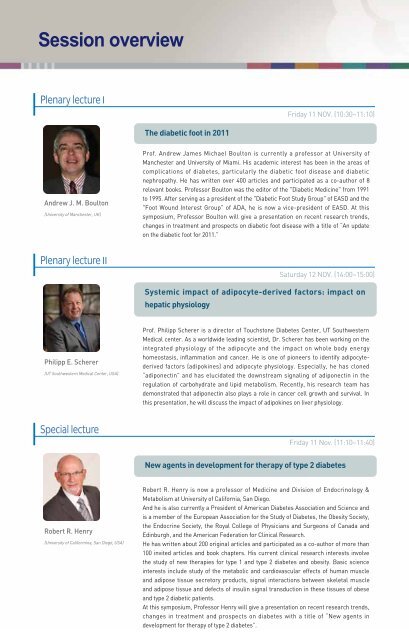

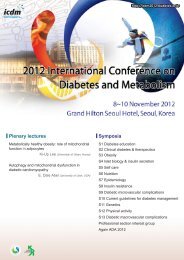
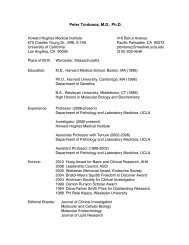

![Microsoft PowerPoint - src.ppt [\310\243\310\257 \270\360\265\345]](https://img.yumpu.com/47977670/1/190x134/microsoft-powerpoint-srcppt-310243310257-270360265345.jpg?quality=85)

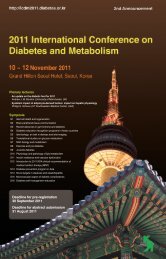

![Microsoft PowerPoint - src.ppt [\310\243\310\257 \270\360\265\345]](https://img.yumpu.com/44373305/1/190x134/microsoft-powerpoint-srcppt-310243310257-270360265345.jpg?quality=85)


